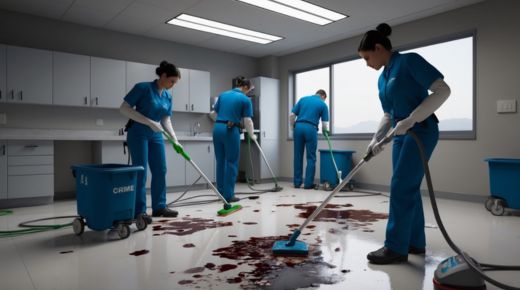Crime scene cleaners tackle gruesome tasks that most people never think about. They work behind the scenes after police investigations, removing blood, bodily fluids, and other hazardous materials. These professionals use specialized equipment and follow strict protocols to restore crime scenes to a safe, clean condition.
The job requires strong stomachs and careful attention to detail. Crime scene cleaners must be thorough in their work to prevent the spread of diseases and eliminate all traces of the incident. They often deal with emotional situations and need to remain professional while showing empathy to those affected.
Crime Scene Cleaner is a simulation game that lets players experience this unique profession. It offers a glimpse into the challenges these workers face daily, from cleaning up blood to disposing of evidence for criminal organizations.
Key Takeaways
- Crime scene cleaners restore safety and cleanliness after traumatic events
- The job demands specialized skills, equipment, and strict adherence to protocols
- Cleaners must balance professionalism with empathy in emotionally charged situations
The Role of a Crime Scene Cleaner
Crime scene cleaners perform a vital but often overlooked job. They clean up after tragic events, removing dangerous substances and restoring spaces to safety.
Defining the Profession
Crime scene cleaners handle the cleanup of areas where crimes, accidents, or deaths have occurred. Their main tasks include removing blood, bodily fluids, and other biohazardous materials. They sanitize and decontaminate spaces to make them safe again.
These professionals often work in homes, businesses, vehicles, and outdoor areas. They use specialized cleaning products and equipment to tackle difficult stains and odors. Crime scene cleaners must be thorough and meticulous in their work.
The job requires physical and emotional strength. Cleaners may encounter disturbing scenes and must remain professional. They provide an essential service to families and communities during difficult times.
Required Qualifications and Skills
Crime scene cleaners need specific certifications to work in the field. Some qualifications to look for include:
- OSHA 30-Hour Card
- HAZWOPER certification
- Bloodborne Pathogen training
- Confined Space certification
A strong stomach and mental resilience are crucial. Cleaners must handle graphic scenes without becoming overwhelmed. Attention to detail ensures thorough cleaning and decontamination.
Physical stamina is important, as the job involves long hours of scrubbing and lifting. Good communication skills help when interacting with clients during sensitive situations. Knowledge of proper safety procedures and biohazard handling is essential to protect oneself and others.
Procedures and Protocols
Crime scene cleaners follow strict steps to handle dangerous materials safely. They use special tools and methods to clean and disinfect thoroughly. A reputable crime scene cleanup service will always have specific protocols and procedures for the customers and their employees.
Initial Assessment and Approach
Cleaners start by assessing the scene. They look for hazards and plan the cleanup. This includes checking for sharp objects and bodily fluids.
They put on protective gear like gloves, masks, and suits. This keeps them safe from harmful substances.
Next, they set up a work area. They use barriers to separate clean and dirty zones. This stops the spread of contaminants.
Cleaners take photos and notes. This helps them track their work and follow rules.
Cleaning and Sanitization Techniques
Cleaners remove visible dirt and stains first. They use special cleaners to break down blood and other fluids.
For a deep clean, they might use steam or strong chemicals. These kill germs that can’t be seen.
They clean from top to bottom. This stops dirty areas from messing up clean ones.
Cleaners use different tools for each task. A mop works for floors. Scrubbrushes help with tough spots.
They might need to remove carpets or parts of walls that can’t be cleaned.
Handling Hazardous Materials
Cleaners follow strict rules for toxic materials. They pack these in special containers marked with warning labels.
They use strong cleaners to kill germs. But they’re careful not to damage the area they’re cleaning.
Cleaners dispose of waste properly. They can’t just throw it in the trash. It goes to special facilities for dangerous items.
They keep records of what they cleaned and threw away. This is important for legal reasons.
After cleaning, they test the area to make sure it’s safe. They might use tools that check for leftover germs or chemicals.
Challenges and Misconceptions
Crime scene cleaners face tough mental hurdles and deal with public misunderstandings about their work. Their job involves much more than people realize.
Psychological Impact
Crime scene cleaners often encounter gruesome scenes that can take a toll on their mental health. They may clean up after violent crimes or accidents in homes and basements. This can lead to stress, anxiety, and even PTSD.
Cleaners must stay focused despite the emotional strain. They need strong coping skills to handle the tough parts of the job. Many companies offer mental health support to their workers.
Some cleaners find their work meaningful. They help families move forward after tragedy. This sense of purpose can help offset the job’s difficulties.
Public Perception and Reality
Many people have wrong ideas about crime scene cleaning. They may think it’s like what they see on TV shows with mature content. In reality, it’s very different.
The job isn’t fast-paced or exciting. It’s slow, careful work that requires attention to detail. Cleaners don’t investigate crimes or handle evidence. They come in after the police are done.
Movies often show crime scene cleaning incorrectly. Real cleaners don’t get perfect scores or dramatic moments. They focus on safety and thorough cleaning. The work can be boring and repetitive.
People may not realize cleaners handle more than just crime scenes. They also clean up after accidents, unattended deaths, and even cases of friendly fire. The job requires a strong stomach and a professional attitude in all situations.
Equipment and Tools of the Trade
Crime scene cleaners use specialized gear to safely and effectively clean contaminated areas. Their tools range from basic cleaning supplies to advanced technological equipment.
Essential Cleaning Supplies
Crime scene cleaners rely on heavy-duty cleaning products and protective gear. They use strong disinfectants and cleaning agents to remove biohazards. Cleaners wear protective suits, gloves, and respirators to stay safe.
Basic tools include mops, buckets, and scrub brushes. Specialized items like enzyme solvents break down biological matter. Absorbent materials soak up fluids. Sharp object containers safely hold needles or broken glass.
Cleaners also use trash bags and containers to dispose of contaminated objects. They may need to remove carpets, drywall, or flooring if these are too soiled to clean.
Technological Aids and Advanced Equipment
Modern crime scene cleaning uses high-tech gear. Specialized decontamination equipment helps clean areas thoroughly. Ozone machines eliminate odors. HEPA vacuums filter out tiny particles.
UV lights detect biological residue invisible to the naked eye. Moisture meters find hidden water damage. Thermal imaging cameras spot temperature differences that may indicate contamination.
Some cleaners use foggers to spread disinfectant in hard-to-reach places. Air scrubbers filter contaminated air. For large scenes, portable cranes or lifts may move heavy objects.
These tools help cleaners tackle even the most challenging jobs efficiently and safely.
Navigating Crime Scene Scenarios
Crime scene cleaners face diverse challenges across different locations and types of incidents. Their work requires adapting to unique situations while maintaining thorough cleaning standards.
Residential Versus Commercial Sites
Crime scene cleaners handle jobs in homes and businesses. Residential sites often involve smaller spaces and personal belongings. This can make the work more emotional.
Commercial sites may be larger, like restaurants or offices. The “Italian Job” mission in some crime scene games shows this. It takes place in a restaurant with a messy crime scene to clean.
Cleaners must respect privacy in homes. In businesses, they work around equipment and valuable items. Both need special care to avoid contamination.
High-Profile Cases and Everyday Incidents
High-profile cases attract media attention. Cleaners must be discreet and work quickly. These jobs may have stricter rules and more oversight.
Everyday incidents are more common. They include accidents, suicides, and undiscovered deaths. The “Back Alley” and “Bad Call” missions in games show these types of scenes.
Each job needs a tailored approach. High-profile cases may require extra security measures. Regular incidents still demand careful attention to detail.
Cleaners must find all evidence and bodies, no matter the case type. They search for hidden areas and secrets. This ensures a complete cleanup, whether the job is big or small.
Operational Aspects of Crime Scene Cleaning
Crime scene cleaning involves complex business, client, and legal considerations. Cleaners must balance professional standards with sensitivity to difficult situations.
Business Considerations
Crime scene cleanup companies need proper licensing and insurance. They invest in specialized equipment like biohazard suits, respirators, and cleaning agents. Pricing varies based on the scene’s size and severity.
Many cleaners offer 24/7 service to respond quickly. They may partner with law enforcement, funeral homes, and property managers for referrals. Thorough documentation is key for billing and legal purposes.
Employee training covers safety protocols and proper cleaning techniques. Workers often rotate duties to prevent burnout from traumatic scenes.
Client Relations and Communication
Cleaners interact with clients during stressful times. They explain the process clearly and set realistic expectations. Discretion is crucial to protect privacy.
Updates are provided throughout cleaning. Photos may document progress. Clients approve the final results before payment.
Follow-up calls check on client satisfaction. Positive customer reviews help build the business reputation. Cleaners may offer resources for grief counseling or repair services.
Legal and Ethical Responsibilities
Crime scene cleaners must follow strict regulations for biohazard disposal. They obtain necessary permits and keep detailed records of waste removal.
Confidentiality agreements protect sensitive information about crimes and victims. Cleaners avoid discussing cases publicly or with the media.
Ethics require respecting the deceased and their possessions. Items of value are properly cataloged and returned to families or authorities.
Cleaners may face emotional challenges from repeated exposure to tragedy. Companies often provide mental health support for workers.

